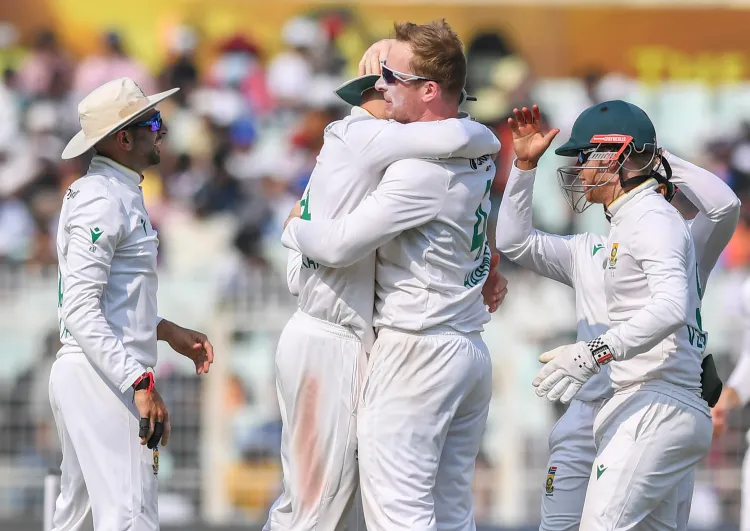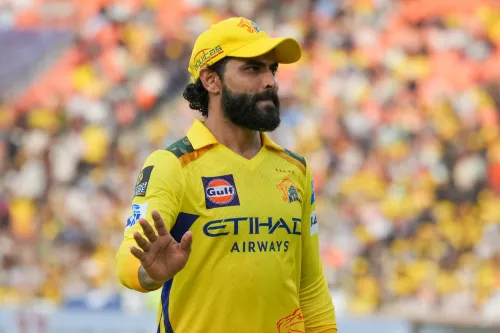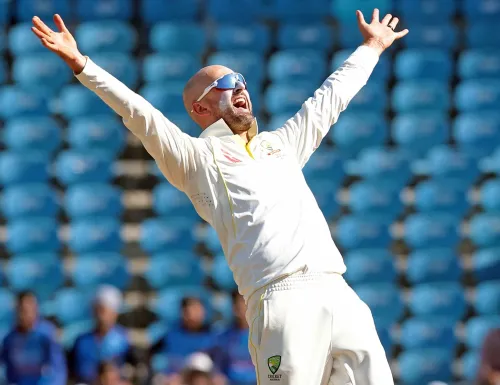How Did Ten Days of Intense Training in Mumbai Transform Simon Harmer's Game to Outmaneuver India at Eden Gardens?

Synopsis
Key Takeaways
- Importance of Mentorship: A strong mentor can guide athletes to rediscover their potential.
- Adaptability: Unlearning old habits is crucial for growth and improvement.
- Focus on Team Success: Prioritizing team victories over personal statistics enhances performance.
- Leadership Qualities: Developing leadership traits is essential for both personal and professional growth.
- Cultural Exposure: Engaging with local culture enriches personal experiences and fosters connections.
New Delhi, Nov 19 (NationPress) Almost ten years after facing challenges in his Test career on Indian grounds, Simon Harmer made a remarkable comeback, achieving figures of 8-51 - the finest by a South African spinner in India. This performance was pivotal in securing a historic 30-run victory for his team within three days at Eden Gardens in Kolkata.
Harmer's impressive four-wicket hauls in both innings showcased his remarkable control and diverse bowling speeds, leaving the Indian batsmen puzzled. During the press conference following his first four-wicket haul in Kolkata, he credited his transformation in Test cricket to Mumbai-based coach Umesh Patwal, prompting a flurry of calls to Patwal's phone.
"I never had any doubts. From the time he played Tests against Pakistan, I knew he was destined for greatness. When I heard the news of his four-wicket haul in the first innings, I typically would catch the highlights later in the evening, but that day my phone started buzzing after he mentioned me in the press conference," shared Patwal.
Patwal added, "Harmer's extraordinary control is evident, and he has almost perfected our discussions from years prior." The foundation for Harmer's outstanding performance in Kolkata was laid nine years ago during an intense 10-day workshop in Mumbai, where he dismantled his spin bowling techniques and rebuilt his approach under Patwal's mentorship.
The first encounter between Harmer and Patwal occurred in May 2015 during a spin camp organized by Cricket South Africa in India, where Patwal served as Director of Cricket at the Global Cricket School. However, after taking just five wickets in two Tests in India, Harmer found himself sidelined for subsequent series against England and New Zealand, leaving his international career hanging in the balance.
In September 2016, Harmer traveled to Mumbai for a 10-day rigorous spin bowling course at Patwal's iThinkSportz Academy. Patwal, who previously coached both Afghanistan and Nepal, noted that Harmer's early frustration stemmed from the need to abandon long-standing beliefs rather than from acquiring new techniques.
"The initial two days were particularly challenging for him as he had to unlearn everything from his Test experiences since my approach diverges from conventional methods. It took him that time to accept this, leading to moments of frustration and tears," Patwal recalled.
Patwal's coaching philosophy often defies traditional spinning techniques. The first lesson focused on grip; he recognized that Harmer was overly reliant on his palm and gripping the ball too tightly, so he encouraged a greater use of the thumb instead.
His rationale was straightforward - utilizing more thumb contact leads to increased revolutions on the ball. Another crucial insight was that a tight grip diminishes an off-spinner’s precision and effectiveness.
Instead, a relaxed hand and a lighter grip enable bowlers to generate more revolutions, akin to a batter needing loose arms for an effortless swing. It’s comparable to driving a car; gripping the steering wheel too tightly hampers maneuverability.
"It's a cycle - one, two, three, and four. Typically, it involves less pivoting and toeing; the finish isn’t the focal point, and the thumb’s role is essential. Everything was counterintuitive - you need to use your thumb and be grounded on your feet while delivering the ball," he explained.
"Moving forward is more crucial than pivoting or twisting, and relaxation trumps worrying about the finish. My instructions diverged significantly from traditional coaching norms," he remarked.
Beyond their extensive training sessions from 7 am to 7 pm for ten consecutive days, Patwal ensured that discussions with Harmer encompassed leadership growth and life perspectives. "We would begin our day with breakfast, discussing the challenges he faced in understanding the concepts, followed by 3-4 hours of practical work and then lunch," he recounted.
"We didn’t just focus on bowling; we delved into personal characteristics and what distinguishes top performers and match-winners. These discussions were critical, followed by more skill work, as at this stage, it’s about fostering understanding rather than mere instruction," he elaborated.
During his stay, Harmer also explored Mahavir Nagar, indulging in local delicacies such as vada pav, chicken tikka masala, and Gujarati cuisine. Additionally, he visited local schools, interacting with players and children there.
Central to Patwal's coaching ethos was fostering leadership qualities and guiding Harmer’s mindset from personal statistics to contributions that win matches. "It's not solely about honing a bowler's skills; it's about instilling leadership capabilities, which Harmer possesses in abundance. This realization empowered him, as aspiring to be the best without leadership is futile," he stated.
"We explored how he could excel as a bowler while embodying leadership qualities. Leading oneself is paramount, and Harmer exemplifies this. His declaration to Bavuma about wanting to represent South Africa again illustrates his ability to transcend boundaries. He respects everyone around him, which is remarkable," he added.
This philosophy has remained with Harmer, evident in his resurgence in Test cricket. After receiving the Player of the Match award in Kolkata, his words - ‘I am not a statsman, I am a win-man’ - brought joy to Patwal. "His message thanking me was heartwarming. It encapsulates our discussions during those 10 days in Mumbai about focusing on winning matches rather than individual wickets," he expressed.
Patwal and Harmer's bond extended beyond their initial ten days together, with follow-up training sessions in Abu Dhabi during an Essex pre-season camp and in Chelmsford, England.
"He invited me to Abu Dhabi and treated me to a luxurious stay, showcasing his generosity. While the Essex team trained, we focused on our individual sessions until Covid-19 intervened. I also spent a couple of days in England, where we practiced together in Chelmsford," he shared.
Currently, as the head coach of the Assam U23 men's team in Vadodara, Patwal won't be able to meet Harmer in Guwahati for the second Test starting Saturday due to prior commitments. However, he concluded by sharing what young cricketers can glean from Harmer’s journey of revitalizing his game through the lessons learned in Mumbai.
"It's about believing in oneself. There’s no one-size-fits-all approach to bowling. If Simon Harmer bowls a certain way, it doesn’t mean others must do the same. Understanding his strengths and believing in oneself is vital. Harmer’s desire to return to play for South Africa was not just about participation; he aimed to win matches - a crucial lesson for aspiring players," he emphasized.
"Young players should focus on winning for their state or country rather than merely playing games. This is the most valuable takeaway from Simon Harmer’s journey, both as a player and as a person for the youth - it’s about contributing to victories, not just personal achievements."









